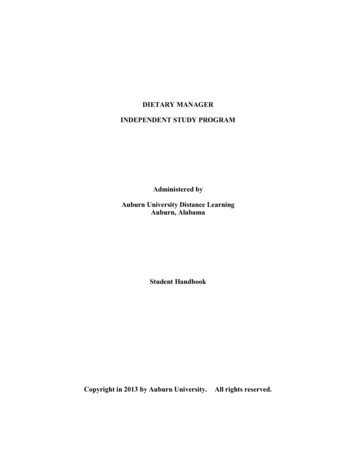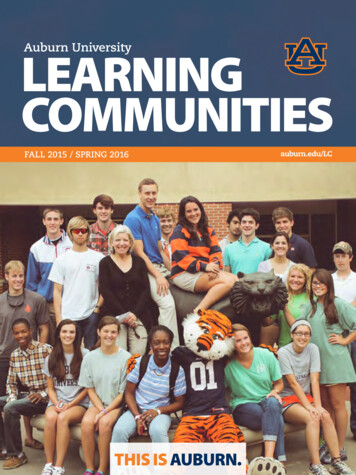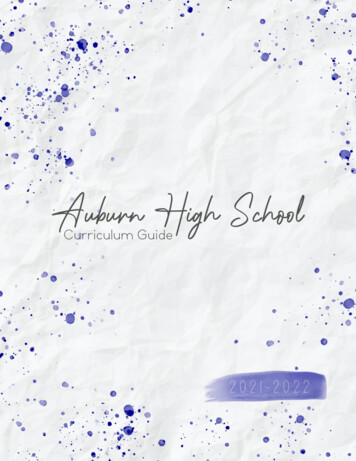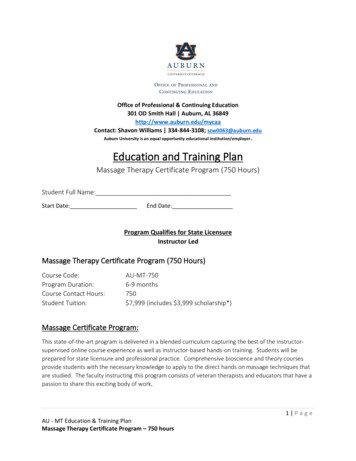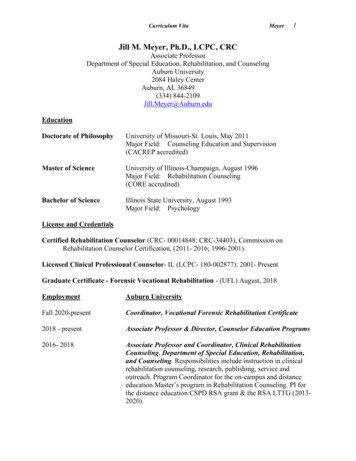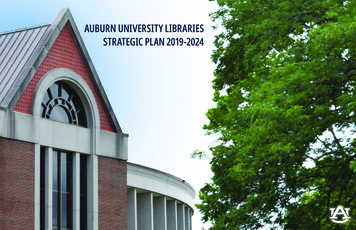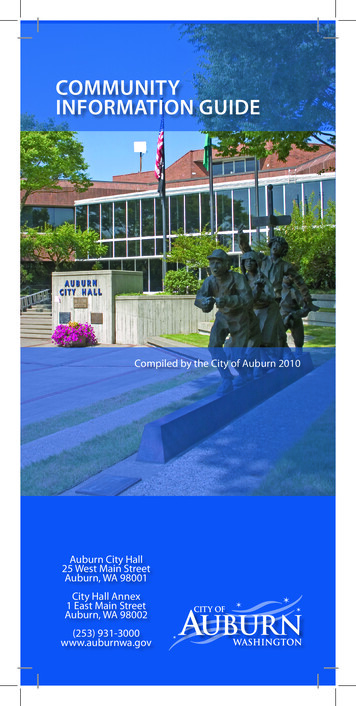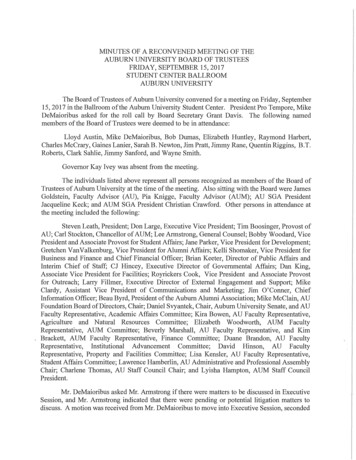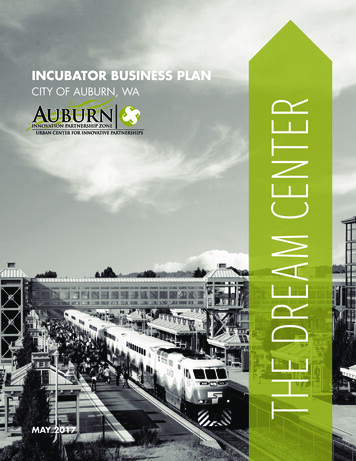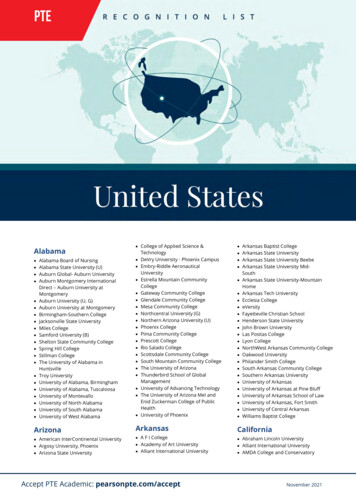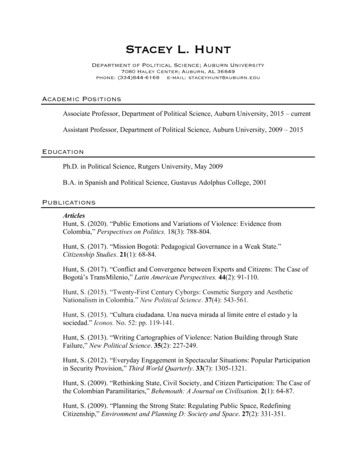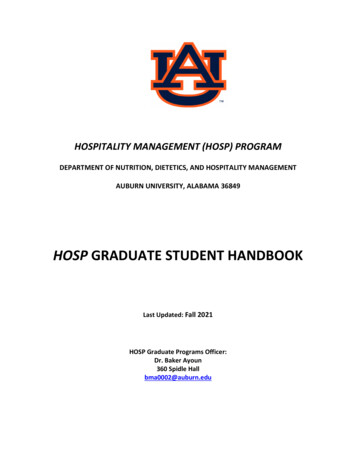
Transcription
HOSPITALITY MANAGEMENT (HOSP) PROGRAMDEPARTMENT OF NUTRITION, DIETETICS, AND HOSPITALITY MANAGEMENTAUBURN UNIVERSITY, ALABAMA 36849HOSP GRADUATE STUDENT HANDBOOKLast Updated: Fall 2021HOSP Graduate Programs Officer:Dr. Baker Ayoun360 Spidle Hallbma0002@auburn.edu
WELCOME FROM THE FACULTYWe welcome you to your journey of graduate study in the Hospitality Management (HOSP)Program, a part of the Department of Nutrition, Dietetics, and Hospitality Management, Collegeof Human Sciences at Auburn University. This journey will at times be exciting, at other timeschallenging, but at all times, interesting. This handbook is designed to assist you along the way.Think of it as a map, a set of guideposts, and a reference manual.We, the HOSP graduate faculty, take our responsibilities to you very seriously. To succeed ingraduate studies, you will have to take your responsibilities very seriously as well. However, therewards can be many: a fulfilling career, enhanced understanding of your chosen field, agrowing circle of professional colleagues and contacts, and the reward of a high level ofpersonal accomplishment. We encourage you to resolve to set the highest standards for eachmilestone in your pursuit of your degree. We wish you well in your studies and encourage youto seek us out when questions and problems arise.The Department of Nutrition, Dietetics, and Hospitality Management offers graduate studyleading to the Master of Science (M.S.) and the Doctor of Philosophy (Ph.D.) degrees inHOSPITALITY MANAGEMENT.Master of Science Degree: The M.S. degree in Hospitality Management is designed to provideadvanced education for the rapidly evolving hospitality field. Students have a choice of twostudy tracks: the on-campus thesis or non-thesis program (non-thesis also offered in distancelearning format). The M.S. degree requires a minimum of 30 semester hours for the thesis trackand 33 for non-thesis. The principal difference between the two programs is the emphasis onprimary research. The thesis project aims to develop the necessary skills to perform high level,timely and relevant research aimed to rejuvenate existing hospitality thinking and practice. Forthe individuals interested in combining current work life with the need for educational andprofessional advancement, the non-thesis requirements include completion of a researchproject relevant to the student’s business environment. Both Master’s tracks offer aninteresting blend of theoretical and applied courses created to keep students abreast of currentmanagement thinking and practice. Particular emphasis is placed on informed decision-makingand management in a global context.Doctor of Philosophy Degree: The Ph.D. degree in Hospitality Management is offered tostudents interested in developing research skills beyond the master’s level and is focused on anacademically oriented career. The Ph.D. program places a strong emphasis on methodology andthe scientific process and equips students with the skill set necessary to make significant
contributions in the chosen research field. Ph.D. students are provided one-on-one researchsupervision at the graduate faculty. Doctoral students are encouraged to interact with theIthaka Hospitality Partners senior leadership team and to identify other possible researchpartnerships, in order to develop projects that are ground-breaking and theoreticallychallenging from an applied perspective. The Ph.D. program requires a minimum of 60semester hours beyond the BS degree and a dissertation describing original research in thestudent’s area of emphasis.This Graduate Student Handbook is designed to acquaint each HOSP graduate student with theprocedures and the details of the degree programs. It is the responsibility of the graduatestudent to read this document as well as information on the Auburn University Graduate Schoolweb pages and to abide by the policies and requirements of the Hospitality ManagementProgram, the Department of Nutrition, Dietetics, and Hospitality Management and AuburnUniversity. Recognize that in the event of a discrepancy(ies) between policies stated in thisHOSP Graduate Student Handbook and policies stated by the Graduate School, Graduate Schoolpolicies take precedent. Review the Graduate School web pages each semester to learn newpolicies and policy changes.
TABLE OF CONTENTSHOSP GRADUATE MISSION STATEMENT & LEARNING OUTCOMES .6CHAPTER 1. MASTER’S DEGREE PROGRAM .8ClassificationCourse Level RequirementsTransfer Credits from another Approved Graduate SchoolTransfer to a Different Degree ProgramTime Limit for the Master’s DegreeSelection of a Major Professor and Advisory CommitteeRegulations Specific to the Master’s Degree – Thesis Track . .10Course RequirementsThesis Topic and WritingResearch and Thesis Hours (HOSP 7990)Thesis FormatThesis DeadlineThesis Defense/Thesis ExaminationMaster’s Degree Program - Thesis Track Progression Checklist . .12Regulations Specific to the Master’s Degree – Non-Thesis Track . 14Course RequirementsNon-Thesis Research (HOSP 7980)Other RequirementsMaster’s Degree Program Non-Thesis Track Progression Checklist .16CHAPTER 2. DOCTOR OF PHILOSOPHY DEGREE PROGRAM .17Student ClassificationPh.D. Program StructureCourse RequirementsSelecting Major Professor and Advisory CommitteeDoctor of Philosophy initial Plan of StudyResidency Requirements for the Doctoral DegreeTime Limitations for the Doctoral DegreeDissertationExaminationsGeneral Doctoral / Preliminary ExaminationDevelopment and Approval of Dissertation proposalFinal Examination for the Doctoral DegreeCandidacy for the Doctoral DegreePh.D. Progression Checklist .27Page 4 of 39
CHAPTER 3. GRADUATE STUDENT RESOURCES, ASSISTANTSHIPS,FELLOWSHIPS, AND AWARDS 29Graduate Student AssistantshipsGraduate Assistant HandbookGraduate Student Fellowships and AwardsSources of Travel Funds for Graduate StudentsHOSP Graduate Student AssociationGraduate Student CouncilCHAPTER 4. HOSP PROGRAM DEPARTMENT OPERATIONS AND SERVICES.32Lines of Authority, E-mail Policy, Fellowships and ScholarshipsOffice Space, Email, Computer Access and Use, Mail, CopyingAppendix A. HOSP Annual Progress Report for Ph.D. Students Form. . . 34Appendix B. Rubric for evaluating the thesis defense . 37Appendix C. HOSP graduate faculty members and their research interests . 38Page 5 of 39
HOSP Graduate Program MissionDevelop world-class graduate students who are able to identify, analyze and respond, in aninformed sense, to the dynamic nature of the global hospitality and tourism fields throughexcellence in teaching, research and applied outreach.HOSP Graduate Program Goals and Student Learning OutcomesPh.D. ProgramProgram Goal 1:Research. To prepare students to be effective researchers in the hospitality and tourismfields.Outcomes: HOSP Ph.D. students will be able toa. Develop a high level of theoretical expertise in the hospitality and tourism fields bygenerating research questions that clearly advances the literature and theirspecific areas of specialty.b. Build up rigorous methodological competencies appropriate to hospitality andtourism fields and student’s specific area of specialty.c. Apply novel research methods/approaches to solve emerging problems in thehospitality and tourism fields.d. Develop knowledge and skills to successfully secure grants and funding to supportresearch.e. Communicate their research clearly and professionally in both written and oralforms appropriate to the hospitality and tourism fields.Program Goal 2:Teaching. To prepare students to be effective educators in the hospitality and tourismfields.Outcomes: HOSP Ph.D. students will be able toa. Foster the understanding of hospitality and tourism knowledge for others (e.g.,students) through demonstrated pedagogical knowledge.b. Integrate research findings into classroom teaching, especially those related tostudent’s academic interests.c. Synthesize feedback gathered from various sources (student, self-evaluation, peers,supervising faculty members, etc.) to continuously enhance teaching effectiveness.d. Create a teaching portfolio that documents and assesses student’s teaching abilitiesand experiences for future employment.Page 6 of 39
Program Goal 3:Professional Development. To enable students to develop as successful professionals andbe attractive to employers for highly competitive positions in academicinstitutions, professional organizations, industry, and government.Outcomes: HOSP Ph.D. students willa. Earn professional certifications related to the various segments of the hospitalityand tourism fields, offered by the department or by outside entities.b. Be involved during their graduate program in preparing for leadership roles andresponsibilities they will assume throughout their future careers.c. Participate in professional organizations, becoming members and attendingmeetings.d. Enhance their professional bases through internships and other industry practicalexperiences.Master’s Program Learning OutcomesA student who graduates with a thesis-track Master’s degree from the Hospitality ManagementProgram will:1. Demonstrate a coherent understanding of the main theoretical foundations of hospitalityand tourism fields through synthesis across courses and experiences.2. Analyze and compare the relative merits of alternative research methods and statisticaltechniques when designing a research project.3. Develop innovative, data-supported, theoretically sound research project related to aspecific area within the hospitality and tourism fields.4. Engage in various instructional experiences and develop teaching skills needed forinstructional positions in the hospitality and tourism fields and/or advancement toward aterminal degree.5. Communicate professionally and effectively in written and oral formats relevant to thehospitality and tourism fields.A student who graduates with non-thesis track Master’s degree from the Hospitality ManagementProgram will:1. Use theoretical tools and concepts to implement problem solving in an industry setting.2. Assess and use appropriate data analytics tools, statistical techniques and yieldmanagement knowledge for decision making in an industry setting.3. Produce a written report addressing industry-based problem.4. Make a professional and academic oral presentation to a learned audience.Page 7 of 39
CHAPTER 1. MASTER’S DEGREE PROGRAMClassification:Students who hold full admission to Graduate School for work toward a Master’s degree areclassified as MST. MSNT refers to Master of Science, Non-Thesis.Course Level Requirements:Graduate courses are those with course numbers in the 6000s, 7000s, and 8000s.Transfer Credits from Another Approved Graduate SchoolGraduate credit taken in residence at an international institution or at a regionally accredited U.S.institution may be transferred when recommended by the student’s major professor, advisorycommittee, graduate programs officer, and when also approved by the dean of the GraduateSchool. Students seeking transfer credit must provide documentary evidence showing therelevance of the course to the student’s program of study and provide an official transcriptshowing credit earned for the course. No prior commitment is made concerning whether transfercredit will be accepted.A student must earn at least 24 semester hours at Auburn University. The limit of hours of transfercredits is 6 semester credit hours. The credit must be acceptable to the student's advisorycommittee and be pertinent to the student's program of study. No course on which a grade lowerthan B was earned may be transferred to Auburn University. Transfer credit must fall within thetime limits of the degree- that is, they must have been earned within six years of the date theAuburn degree is awarded.Additionally, credit will not be allowed if the combined GPA on graduate work taken at otherschools is less than 3.0 on a 4.0 scale, nor may transfer credit be used to improve the GPA oncourses taken at Auburn University.Transfer to a Different Degree ProgramA student transferring from one department to another is required to submit a new applicationfor admission. Changes in application status (Master's to doctoral, doctoral to Master's) orenrollment status (Master's to doctoral, doctoral to Master's) must be requested by theapplicant/student involved and endorsed by the department head or chair, major professor, andadvisory committee for enrolled students and approved by the Dean of the GraduateSchool. Current international students must recertify financial support for the issuance of a"new" I-20 form.Time Limit for the Master’s DegreeAll graduate work toward a Master’s degree must be completed within a period of six calendaryears. The student’s time to completion begins with the earliest completed course approved forinclusion in the program of study toward the completion of the degree.Page 8 of 39
Selection of a Major Professor and Advisory CommitteeRegulations regarding the major professor: The major professor must be a member of HOSPGraduate Faculty, either Level 1 or 2, to serve as a major professor for a Master’s student. Thestudent’s choice of a major professor is an important one and should not be taken lightly. Manydiverse roles may be played by the major professor including counseling, approving the student’sselection of graduate courses, helping to select members of the student’s advisory committee,directing the student’s research and mentoring, and planning of continuous enrollment untildegree awarded.The student is advised to choose a major professor who is interested in and has knowledge of atopic he/she wants to pursue as a thesis or industry based research problem. The student shouldchoose a faculty member who can give him/her an amount of time and the level and type ofguidance that is consistent with what the student needs as he/she conducts research. Studentsare encouraged to meet with several HOSP faculty members before they select a major professor.Students are also encouraged to talk to second-year students and/or past graduates of theprogram before selecting a major professor.Regulations regarding the advisory committee for the Master’s degree, thesis-track student: Thecommittee is required to have a minimum of two additional faculty members. At least one of thetwo must be from the HOSP program and at least one of the two must be Graduate Faculty.Selection of committee members should be done after selection of the major professor. Affiliatefaculty and other scholars not employed by the University may serve on individual advisorycommittees with the approval of the Dean of the Graduate School. Official approval of the MajorProfessor and Advisory Committee occurs when the Committee Selection Form, available online,is approved by the Graduate School. This committee will approve the student's program of study,conduct any required examinations and direct the required thesis.Page 9 of 39
Regulations Specific to the Master’s Degree - Thesis TrackCourse Requirements: The thesis track of the Master of Science in Hospitality Management degreerequires a minimum of 30 semester hours.Required Core CoursesCourseNumberHOSP 7050HOSP 7090HOSP 7500PSYC 7270PSYC 7730HOSP 8910HOSP 7990Course TitleAdvanced Hospitality OperationsConsumer Behavior in Hospitality & TourismGlobal Hospitality StrategyExperimental Design in Psychology IResearch Methods Indsl./Orgl Psyc.Can be substituted with CADS 7050, HDFS 7050, orMNGT 8030Supervised TeachingResearch and ThesisElective graduate-level coursesNumber of CreditHours333431Minimum of 4Minimum of 9, atleast 6 of whichmust be HOSP hoursExamples of Elective Courses:CoursesHOSP 6530Science of Quality Service in HospitalityHOSP 7000Hospitality EnterpriseHOSP 7010Advanced Tourism AnalysisHOSP 8860Current Issues in Hospitality ManagementNTRI 7850Master's SeminarHOSP 6460Catering and Event ManagementHOSP 6461Catering and Event ManagementHOSP 6550Club ManagementHOSP 6540Conference CoordinationMNGT 6560LeadershipBUSI 7150Managing Organizational ChangeHOSP 8870Adv. Hospitality Mgt. Research & ApplicationsHOSP 8880Theoretical Developments for HospitalityHOSP 7920Professional Internship in HOSPHOSP 7960Special ProblemsHOSP 8020New Faculty Development in HospitalityHOSP 8970Grantsmanship for Hospitality & Tourism ResearchNTRI 8970Advanced Topics in NTRINTRI 6380Study Travel in NTRINTRI 8970 EA2 Thesis and Dissertation WritingCredit Hours33331123333331-31-3231-3variable hours3A. Thesis Topic and Writing:The topic selected for the thesis must be approved by the student’s majorprofessor and advisory committee. The student prepares and conducts theresearch under the direction of the major professor.Page 10 of 39
B. Research and Thesis hours (HOSP 7990):1. The student in the thesis track must register for a minimum of 4 credit hours ofHOSP 7990. No more than 6 hours of HOSP 7990 may be counted toward theMaster’s degree for thesis track students.2. The student may register for 1 or more hours of HOSP 7990 at a time, but must beregistered for at least 1 credit hour each semester in which the student is workingon the thesis proposal, conducting thesis research, and writing the thesis. Inaddition, the student must be registered for at least 1 credit hour during thesemester in which the student’s thesis defense will occur.C. Thesis Format:The Graduate School does not require that students submit paper copies oftheses and dissertations, only electronic submission. For a complete descriptionof format requirements, see the Graduate School’s Electronic Thesis andDissertation Guide (ETD Guide) tronic-thesis-dissertation-guide/.The Department of Nutrition, Dietetics, and Hospitality Management, however,may continue to require paper copies. Graduate students are advised to consultwith their major professor and advisory committee.Submission of a thesis is defined as the time at which the first complete draft ofsuch is submitted to the major professor for review. The Graduate School acceptsonly theses prepared according to the Guide. Refer to the Approval Processsection in the Guide to have a final format check done. If the electronic thesisneeds corrections, the student’s graduation may be delayed at least onesemester. Auburn University reserves the right to make copies of the thesis, butthe student retains all publication rights. Effective Summer 2005, all theses mustbe published electronically through AU-ETD.D. Thesis Deadline:1. The Graduate School Calendar, in the Bulletin, lists the deadline for acceptance offinal thesis by the Graduate School each semester. “Final” means that the thesis isready for uploading.2. The graduate student is encouraged to get a Thesis Format Check prior to theThesis deadline. Guidelines for obtaining a format check are given in the GraduateSchool’s Electronic Thesis and Dissertation Guide (ETD Guide) athttp://www.grad.auburn.edu/etd guide.htmlPage 11 of 39
E. Thesis Defense / Thesis Examination:1. The major professor will schedule the thesis defense not later than the deadlineindicated in the Graduate School calendar. The thesis should be provided to themembers of the advisory committee at least two weeks before the scheduled thesisdefense meeting. The thesis defense should be open to members of the GraduateFaculty as visitors. A thesis defense rubric (see Appendix B) will be used bymembers of the advisory committee for evaluating the thesis. Successfulcompletion of the thesis defense requires the unanimous support of all members ofthe advisory committee.2. If a student fails the thesis defense, one re-examination may be given onrecommendation of the advisory committee and approval by the Dean of theGraduate School. Further examinations will be allowed only under exceptionalcircumstances and with approval of the Graduate Council.The following checklist is intended to serve as a quick reference to assist the student indetermining whether requirements have been met. It is the responsibility of the student to keepthis checklist current and to meet all requirements on time.HOSPITALITY MANAGEMENTMASTER’S DEGREE PROGRAM – THESIS TRACKProgression ChecklistRequirementDevelop an initial plan ofstudy worksheetSelect a Major ProfessorMeet and set up AdvisoryCommitteeTimelineDuring the first semester ofenrollmentDuring second semester ofenrollmentDuring second semester ofenrollmentDevelop and approve ThesisProposalComplete and submitthe Committee Selection Formto Graduate SchoolAt least one semester prior tothe semester of expectedgraduationPage 12 of 39Instructions/NotesFor assistance, consult with yourtemporary advisor (the HOSP graduateprograms officer).Official approval of the major professorand advisory committee occurs when theCommittee Selection Form is approvedby the Graduate School.Topic must be approved by the majorprofessor and advisory committee. Thestudent must register for at least 1 credithour of HOSP 7990 each semester thestudent is working on the thesis proposal,conducting and writing thesis research.If required, obtain IRB approval beforeconducting researchSubmit using this ommittee-selection/
Check academic calendar for deadlinesSubmit GraduationApplicationClear any Incomplete GradesClear all holdsPrior to the last day of thesemester preceding the expectedsemester of graduationAt least three weeks before thedate of graduationEnrollment in the semester ofgraduation.Semester of graduationSchedule final oral examSchedule the thesis defense notlater than the deadline indicatedin the Graduate School calendar.Review AU Thesis FormatCheck GuidelinesSemester of graduationSubmit from AU Access, MyAcademics, Grad ApplicationAn overall GPA of 3.0 or higher (on ascale of 4.0) is required.At least one credit hour. If defendingthesis, enroll in HOSP 7990; if thesis issubmitted and all graduationrequirements are met by the last day ofthe previous semester, enroll in GRAD7000 Thesis Completion.Access the web form at:https://web.auburn.edu/alpha/forms/form-c.aspx ; provide a date, time, andlocation for your final oral exam.Upon form submission, each committeemember will automatically receive anannouncement of the exam, and whenthe exam date arrives, the committee willbe notified via email to provide theresults of the exam.See the Graduate School’s ElectronicThesis and Dissertation Guide, and theThesis Format Check Guidelines athttp://www.grad.auburn.edu/etd guide.htmlAll degree requirements must becompleted within six calendar years.GraduationPage 13 of 39
Regulations Specific to the Master’s Degree –Non-Thesis Track(On-Campus and Distance Learning)Course Requirements: The non-thesis track of the Master of Science in Hospitality Managementdegree requires a minimum of 33 semester hours.Required Core CoursesCourse Number*HOSP 7050HOSP 7090HOSP 7500HOSP 7980Course TitleAdvanced Hospitality OperationsConsumer Behavior in Hospitality & TourismGlobal Hospitality StrategyNon-Thesis ResearchElective graduate-level coursesNumber of Credit Hours3334Minimum of 20, at least 6of which must be HOSPhoursExamples of Elective Courses:CoursesHOSP 6460Catering and Event ManagementHOSP 6461Catering and Event ManagementHOSP 6530Science of Quality Service in HospitalityHOSP 7960Special ProblemsHOSP 6550Club ManagementHOSP 7920Professional Internship in HOSPNTRI 6380Study Travel in NTRIHOSP 8860Current Issues in Hospitality ManagementAdvanced Tourism AnalysisHOSP 7010HOSP 7000Hospitality EnterpriseHOSP 6540Conference CoordinationBUSI 7150Managing Organizational ChangeMNGT 6560LeadershipNTRI 7850Master’s SeminarERMA 7300Design and Analysis in Education ICredit Hours1231-331-3variable hours33333313*Distance learning students enroll in the D** sections of the courses.Non-Thesis Research (HOSP 7980)The student in the non-thesis track must register for a minimum of 4 credit hours of HOSP7980. Students will register for HOSP 7980 during all semesters in which they are working onthe research project. Students in the non-thesis track may not count HOSP 7990 Researchand Thesis hours for credit on their program of study for Master’s degree.Page 14 of 39
Non-thesis Project Guidelines:The non-thesis project can take one of the following different forms:- Practice-Based Basic Research Project.This route is appropriate when a student would like to address a problem relevant tothe hospitality or tourism fields. The student selects a topic to research, searches theliterature, writes a proposal, and obtains materials to analyze. Through conforming toestablished minimum research methods, the student will demonstrate an ability toidentify and respond to the problem from an applied and professional outlook. The finaldeliverable is a research paper with all information properly cited. Although theresearch project is not necessarily expected to be published in a peer-reviewedacademic journal, the resultant report is expected to be of quality high enough to bepresented at a professional conference or meeting.-Project Report.This route is appropriate when a student would like to build practical knowledge relatedto own career goals. The project could be based on personal experience at work or anissue the student learned about in a class. The report can take one of various forms,including, but are not limited to, completing a feasibility study, developing a thoroughcase study, or the preparation of a systematic review. For all forms of the report, theprocess involves selecting a project, examining relevant literature, writing a proposal,carrying out the project, and developing the final report, including recommendations foraddressing the issue.Compared to a practice-based basic research experience, the project report is typicallynarrower in scale, less engaging, and shorter in length. The project selected must beapproved by the student’s major professor. The student and major professor willdecide whether to present the project report in an open seminar.The evaluation of the student's performance is conducted by the major professor (and theother faculty member if one is part of the advisory committee), based on a satisfactorycompletion of the quality of the non-thesis project. If the student project is assessed asunsatisfactory, the student will be given one opportunity to correct the deficiencies andresubmit and/or re-present the work. Students who still fail on their second attempt will bedropped from the program.Page 15 of 39
The following checklist is intended to serve as a quick reference to assist the student indetermining whether requirements have been met. It is the responsibility of the student to keepthis checklist current and to meet all requirements on time.HOSPITALITY MANAGEMENTMASTER’S DEGREE PROGRAM – NON-THESIS TRACKProgression ChecklistRequirementDevelop an initial plan ofstudy worksheetTimelineDuring the first semester ofenrollmentSet up Advisory Committee(if needed)During second semester ofenrollmentDuring second semester ofenrollmentComplete and submitthe Committee Selection Formto Graduate SchoolAt least one semester prior tothe semester of expectedgraduationSelect a Major ProfessorClear any Incomplete GradesClear all holdsFor assistance, consult with yourtemporary advisor (the HOSP graduateprograms officer).Official approval of the major professorand advisory committee occurs when theCommittee Selection Form is approvedby the Graduate School.Submit using this ommittee-selection/Check academic calendar for deadlinesTopic must be approved by the majorprofessor and advisory committee. Thestudent must register for HOSP 7980(HOSP 7986 for distance-learningstudents) each semester the student isworking on the research project.Develop a Proposal for theResearch ProjectSubmit Graduation ApplicationInstructions/NotesPrior to the last day of thesemester preceding the expectedsemester of graduationAt least three weeks before thedate of graduationEnrollment in the semester ofgraduation.Semester of graduationSchedule the Non-ThesisResearch Project DefenseMeetingSee Graduate School calendarfor Form 8 submission deadlineIf required, obtain IRB approval beforeconducting research.Submit from AU Access, MyAcademics, Grad ApplicationAn overall GPA of 3.0 or higher (on ascale of 4.0) is required.At least one credit hour. If presentingresearch project, enroll in HOSP 7980(HOSP 7986 for distance-learningstudents).Make appropriate arrangements withyour major professor and HOSP programto schedule the meeting.Schedule using the final oral exam.Submit signed Form 8 to GraduateSchool (gradforms@auburn.edu)All degree requirements must becompleted within six calendar years.GraduationPage 16 of 39
CHAPTER 2. DOCTOR OF PHILOSOPHY DEGREE PROGRAMThe Doctor of Philosophy is conferred in recognition of the mastery of a special field of learning asshown by the satisfactory completion of a prescribed course of study and investigation, thesuccessful passing of general examinations covering the major and minor fields, the preparation ofdissertation reflecting high achievement in scholarship and independent investigation, and thepassing of a final examination on the dissertation and related subjects. The degree is a researchdegree, and is not conferred merely upon fulfillment of technical requirements, but awarded inrecognition of the ability to think and work independently, originally, and creatively in a chosenfield.Student Classification: Students must hold full admission to Graduate School for a doctoralprogram; Doctoral students are classified by the Graduate School as PHD.Ph.D. Program StructureThe Ph.D. prog
HOSP Graduate Programs Officer: Dr. Baker Ayoun 360 Spidle Hall . bma0002@auburn.edu. . student to read this document as well as information on the Auburn University Graduate School web pages and to abide by the policies and requirements of the Hospitality Management Program, the Department of Nutrition, Dietetics, and Hospitality Management .
